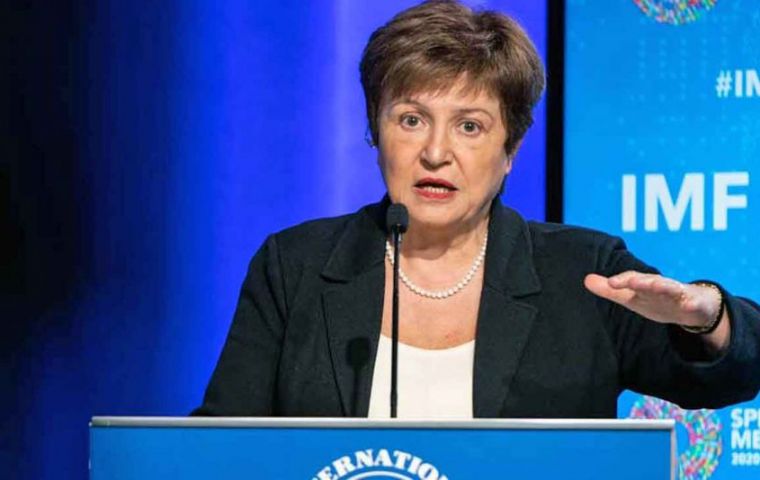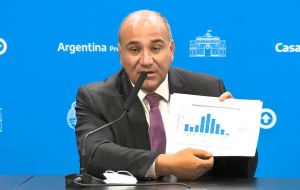MercoPress. South Atlantic News Agency
IMF: inflation is Argentina's main threat
 Some of the global changes are good for Argentina, Georgieva pointed out
Some of the global changes are good for Argentina, Georgieva pointed out International Monetary Fund (IMF) Managing Director Kristalina Georgieva Wednesday said the greatest risk facing Argentina was inflation. She made those remarks during a speech at the Joint Assembly of the IMF and the World Bank in Washington, DC.
“The big risk is inflation, which is also driven by exogenous factors,” Georgieva explained as she listed “three priorities” stemming from inflation worldwide
In Georgieva's view, the challenge ahead for Argentina is “the implementation of the program” through which it managed to refinance its US$ 45 billion debt, which will require “recalibrating it to reflect changes in the global economy.”
However, she underlined that some of those changes had a favorable tone: “Some changes are positive because Argentina is a commodity exporter,” Georgieva noted.
The IMF head also highlighted another challenge for the administration of President Alberto Fernández was “how to bring inflation to a point where they can have confidence in saving in their currency.”
Her words came at a time when rumors of possible dollarization circulate in Buenos Aires' financial circles. It is also one of the main strategies heralded by Deputy Javier Milei, an Economist who belongs to neither major political party and has announced he would run for President in 2023.
In its latest World Economic Outlook (WEO), the IMF forecast growth for Argentina of 4% in 2022, one percentage point above January's projections. However, it also predicted annual inflation of 51.7%, almost four points above calculations from three months ago.
The IMF anticipated that the war “will slow economic growth and increase inflation” worldwide.
Despite the favorable numbers for Argentina, the WEO results were a massive setback for global recovery, as it cut global growth forecasts to 3.6% for both this year and 2023, lowering growth for 143 countries. “We face one crisis after another. The war on top of the pandemic. It is like being hit by another storm before we have recovered from the last one,” Georgieva described.
“There are three pressing priorities arising from inflation,” she said.
First, “it requires decisive action by central banks: they must keep their finger on the pulse of inflation and adjust policy as needed.”
Second, “high and rising food prices are of particular concern, especially in poor countries where there is a growing risk of a food crisis,” for which she called for joint international action to prevent this.
And third, “fighting inflation by tightening monetary policy raises debt servicing costs.” Troubled countries “can help finance this with more equitable fiscal policies,” Georgieva pointed out.
She also considered international support through the G-20 Common Framework for Debt Treatment essential. She added that this mechanism “must be enhanced with clear procedures and deadlines for debtors and creditors.”
Meanwhile, in Buenos Aires, Argentina's Cabinet Chief Juan Manzur forecast inflation “will go down” after March's 6.7% peak, but it will be “a process that will take time” to materialize. “What we seek is to generate predictability and sustainability to the Government's public policies,” he explained.
“In the framework of an economy as battered as ours, this global inflationary process has a great impact. But we are going to continue normalizing the macroeconomy.”





Top Comments
Disclaimer & comment rulesCommenting for this story is now closed.
If you have a Facebook account, become a fan and comment on our Facebook Page!